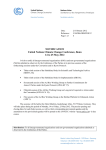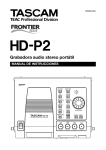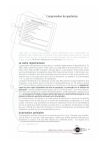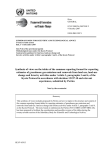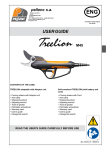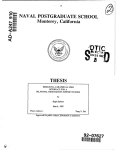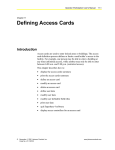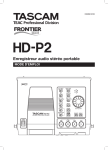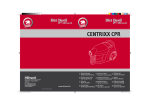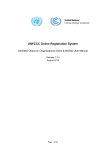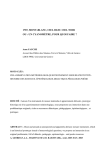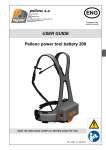Download COP 19/CMP 9, Warsaw, Poland, 11 - 22 November 2013
Transcript
dD R A F T Date: 9 August 2013 Reference: CAS/OBS/COP 19/AUG.13 Page 1 of 14 NOTIFICATION United Nations Climate Change Conference Warsaw, Poland, 11 to 22 November 2013 I wish to inform all intergovernmental organizations (IGOs) and non-governmental organizations (NGOs) admitted as observers by the Conference of the Parties of the forthcoming sessions under the Convention and its Kyoto Protocol: The nineteenth session of the Conference of the Parties (COP 19), from Monday, 11 November to Friday, 22 November 2013; The ninth session of the Conference of the Parties serving as the meeting of the Parties to the Kyoto Protocol (CMP 9), from Monday, 11 November to Friday, 22 November 2013; The thirty-ninth session of the Subsidiary Body for Scientific and Technological Advice (SBSTA 39); The thirty-ninth session of the Subsidiary Body for Implementation (SBI 39); The third part of the second session of the Ad Hoc Working Group on the Durban Platform for Enhanced Action (ADP 2.3). The exact dates of SBSTA 39, SBI 39 and the third part of ADP 2, will be clarified in due course. The sessions will take place at the Stadion Narodowy (National Stadium), Al. Księcia J. Poniatowskiego 1, 03-901 Warsaw, Poland. Distribution: To all intergovernmental organizations and non-governmental organizations admitted as observers by the Conference of the Parties. Page 2 Nominations from IGOs and NGOs should be conveyed to the secretariat through the online registration system. As of today, and until Monday, 16 September 2013 at midnight Central European Time (CET), this convenient and user-friendly system will be open to receive nominations. The secretariat is not able to process nominations sent by any other method, such as emails, letters or faxes. The online registration system is available at the following web address: <https://onlinereg.unfccc.int/> The user manual for admitted observer organizations (IGOs and NGOs), which contains complete information and guidelines on how to obtain access to the system and its use, can be found at the following web address: < https://onlinereg.unfccc.int/onlinereg/public/UNFCCC_ORS_User_ManualObserver_Organisations.pdf> A help desk is available at the following email address: <[email protected]> I would like to remind IGOs and NGOs that the Conference of the Parties, by decision 23/CP.18, invited Parties to commit to meeting the goal of gender balance by, inter alia, nominating women to bodies established under the Convention and its Kyoto Protocol, with the aim of a gradual but significant increase in the participation of women. To this end, I would like to encourage the nomination of women participants to attend the forthcoming sessions. The annex attached to this notification provides key information for participants in addition to actions to reduce the carbon footprint of the conference. All additional information concerning the sessions will be posted on the UNFCCC website <www.unfccc.int> in due course. Participants in a position to do so are encouraged to consider offsetting the carbon footprint associated with their attendance at the Warsaw Conference. Yours sincerely, (Signed by) Christiana Figueres Page 3 Annex Information for participants Visas All foreign delegates entering the Republic of Poland must have a valid passport. Participants requiring a visa for Poland, or a transit visa, are strongly encouraged to contact the appropriate consular authorities immediately upon receipt of this notification. To facilitate the issuance of a visa, a copy of this notification should be attached to the visa request. For more information, please visit the website of the Polish Foreign Ministry, at <http://www.mfa.gov.pl/en/>. Additional information on the issuance of visas can be found at the following link on the host government’s web page for the conference: <http://www.cop19.gov.pl/tips-for-visitors-to-poland>. Hotels If you require assistance in locating and booking accommodation for your stay in Warsaw during COP 19/CMP 9, please visit the host government’s web page for the sessions at <http://www.cop19accommodation.com/>. Online registration for IGOs and NGOs to nominate their representatives is: Nominations Open as of today until Monday, 16 September 2013 at midnight Central European Time (CET) Online registration for IGOs and NGOs to confirm their representatives is: Open from Friday, 20 September 2013 at midnight CET until Thursday, 7 November 2013 at midnight CET. Nominations and side events and exhibits Potential organizers, speakers, participants and technical staff for side events and exhibits must be nominated as representatives of Parties or admitted observer organizations for the sessions to ensure that they are granted access to the premises All formalities regarding registration, including issuance of badges to duly nominated participants to attend the sessions of the Convention and its Kyoto Protocol, are free of charge. Upon arrival, you are requested to register at the Registration area located in the National Stadium in Warsaw from Saturday 9, November to Friday, 22 November 2013 during the opening hours indicated below., Registration The acknowledgement of the participant’s nomination, which is available upon confirmation in the online registration system, and a valid photo identification should be presented to the registration staff in order to ensure issuance of your badge For all participants, a valid passport or a nationally approved identification card is required The minimum identification document requirements are: Name written in a Latin alphabet Passport-sized photograph Page 4 Nationality Date of birth A unique identification number Registration opening hours: Saturday, 9 November until Saturday, 16 November 2013, from 8.00 a.m. to 7.00 p.m. Sunday, 17 November 2013, registration will be closed. Monday, 18 November until Thursday, 21 November 2013, from 8.00 a.m. to 7.00 p.m. Friday, 22 November 2013, from 8.00 a.m. to 6 00 p.m. Registration for IGOs and NGOs will be closed on Monday, 11 November from 8.00 a.m. to 12.00 p.m. To avoid delays, it is highly recommended that you register on Saturday, 9 November or Sunday, 10 November. Please see the section below “Access to premises”. Please be aware that you can only register once for the sessions. Double registration is not permitted (i.e. as a State representative and an observer organization representative, or as an observer organization representative and a press/media representative). Access will be granted to participants from Monday, 11 November 2012 to Friday, 22 November 2013. Access to premises Representatives who are issued a photo badge under the nomination by an organization that was allocated an exhibit stand will be granted access to the venue as of 1.00 p.m. on Sunday, 10 November 2013. Participants are strongly recommended to obtain comprehensive international medical insurance for the period of participation. The United Nations and the Convention secretariat disclaim all responsibility for medical, accident and travel insurance, for compensation for death or disability, for loss of or damage to personal property and for any other costs or losses that may be incurred during travel or the period of participation. Disclaimer Badges In the interest of the security and safety of all participants and the smooth running of the sessions, the Convention secretariat reserves the right to deny and/or restrict access to the conference premises, or to request registered participants to leave the premises. The Convention secretariat shall not be responsible for any or all expenses incurred by nominated participants who are requested to leave the premises, or refused registration or access to the sessions for which they have been nominated and/or registered as participants. It is essential that you have an official UNFCCC conference badge in order to gain access to the premises. These are issued only on the basis of confirmation in the online registration system by an admitted observer organization. For security reasons, all participants are requested to wear their badges visibly at all times. Page 5 Side events and exhibits The application period for side events and exhibits ended on Friday, 26 July 2013 at 5.00 p.m. CET. The number of side events applications exceeded by far the number of available slots. Therefore, further applications will not be considered at this stage, however, a waiting list will be prepared for late requests in case there any cancellations. For additional information, please contact <[email protected]>. Please also read “Nominations and side events and exhibits” and “Access to the premises” above. Code of conduct and other policies Participants at sessions are governed by the relevant guidelines and policies, including the guidelines for the participation of representatives of nongovernmental organizations at meetings of the bodies of the UNFCCC (code of conduct) and other policies, which are provided together with this notification. Essential documents Please consult the UNFCCC website at <http://maindb.unfccc.int/library> for all available session documents. Press briefings In order to facilitate observer organizations wishing to hold press/media briefings during the forthcoming sessions, the secretariat requests that the organizations inform it in advance to what extent they intend to hold such briefings during the sessions. This will facilitate adequate logistical and technical arrangements to be put in place. Requests should be addressed directly to the UNFCCC Press Office, telephone: +49 228 815 1005, email: <[email protected]>. More information on press conferences can be found at http://unfccc.int/press/items/4862.php. Page 6 Actions to reduce the carbon footprint of the conference For trips to Warsaw, where feasible the train should be used instead of car, coach or plane. Parties and representatives in a position to do so are invited to consider offsetting the carbon footprint associated with their attendance at the conference. Travel In Warsaw, travel by foot, bicycle or public transportation as much as possible. Where the latter is not available, arrange group pick-up from the hotel. The secretariat will purchase CERs and cancel an amount equivalent to its overall carbon footprint, thereby offsetting its greenhouse gas emissions including those caused by travel to Warsaw of staff and funded participants. Accommodation Shipment allowance If possible, choose a hotel that is operated in an environmentally responsible manner. Select a hotel located near public transportation. In order to reduce the carbon footprint of the conference, and due to logistical considerations such as storage, the secretariat will not be in a position to receive shipments in excess of a cumulative total weight of 150 kg per Party and observer organization. Parties or observer organizations organizing ‘areas’1 within delegation offices on a commercial basis will be permitted an extra allowance of 50 kg per ‘area’. Detailed information on consignments and shipping, including on customs clearance, will be made available in due course. Participants are encouraged to print only what is minimally necessary prior to the sessions. Once on site in Warsaw, request only essential documents from the Documentation Services Desk. Print and photocopy on both sides and keep the font size to a legible minimum. Recommendations on paper use and Collect and re-use paper that has print on one side only. recycling Any paper used (e.g. for promotional material, programmes, signs) should be 100 per cent recycled, with a minimum of 65 per cent of post-consumer waste content and totally or elemental chlorine free. The use of colour paper should be avoided. Use the waste collectors provided during the session and recycle items such as bottles, cans and paper. 1 In this context, an ‘area’ is defined as a clearly defined and delimited space, incorporated as such in the secretariat’s space allocation scheme and regardless of its size, where Member States showcase their achievements, products and services pertaining to climate change. Page 7 Distribution of paper documents in general Efforts are being made to reduce paper consumption. In this context, participants – including exhibitors – are requested to distribute limited amounts of paper documents only if and where necessary. Instead, the secretariat recommends the use of USB flash drives and CD-ROMs for the dissemination of information. Posting Quick Response (QR) codes on exhibit stands or poster boards is also encouraged. For the distribution of publications and other information materials at exhibit stands or side events, the secretariat encourages organizers to use the web-posting function of the Side Events and Exhibits Online Registration System (SEORS) and upload electronic publications onto the UNFCCC website. This function also allows advertising and reporting of side events. In order to reduce the carbon footprint of side events and exhibits, as per past practice flyers for side events and outside events will not be accepted for distribution through pigeonholes. Side event schedules will be announced through the UNFCCC website, the Side Events and Exhibits brochure, the secretariat’s poster board listing the day’s events, and the free UNFCCC iPhone/ iPad application ‘Negotiator’. Information on outside events may also be posted on the UNFCCC website. Distribution of materials through pigeonholes Please note that the secretariat strongly encourages materials in electronic/ digital format (USB flash drives, CD-ROM, etc.). Authorization is unlikely to be given unless the materials are in such format. Please consult the secretariat via <[email protected]> before the arrival of the materials at the venue if you have any questions. Participants are requested to refrain from distributing non-official material, such as information related to other meetings, future conferences or publicity material, via the pigeonholes. On an exceptional basis, personalized invitations, publications or documents by a Party or an admitted observer organization that are clearly attributed to the climate change negotiations may be authorized for distribution through the pigeonholes. Electronic dissemination of information As an alternative to printed materials, the secretariat encourages the use of QR codes or similar mobile tags for the electronic dissemination of information to the extent possible. In this context, please note that daily updates on the negotiations such as ENB, ECO, and TWN will mainly be disseminated in electronic formats. In order to facilitate access, the secretariat will include web links to these updates in the Daily Programme. The publishing organizations may display a copy with QR codes at their exhibit stand and/or poster boards. The Daily Programme for the conference will be made available in electronic form only. A PDF version will be made available each morning on the UNFCCC conference website. Energy conservation Turn off room lights and IT equipment when not in use and enable energy-saving features. Recycling of badges and lanyards Please keep the UNFCCC lanyard for use at your next UNFCCC meeting or alternatively, return it to the secretariat after the conference. Boxes will be placed by the main entrance of the National Stadium for this purpose. ----- Page 8 Guidelines for the participation of representatives of non-governmental organizations at meetings of the bodies of the United Nations Framework Convention on Climate Change March 2003 Page 9 Roles of the secretariat and non-governmental organizations The security of the venues for sessions and meetings of the Convention bodies is the responsibility of the secretariat. The Executive Secretary has the authority to take any action necessary to maintain this security, including denying access to the venues. Non-governmental organizations are responsible for the conduct of each of their representatives. Any behaviour not consistent with these guidelines may have an impact on the participation of the organization and/or of the individual. The secretariat welcomes the full support of participants in maintaining an ambience conducive to intergovernmental discussions and negotiations, and to open and fruitful dialogue between Parties and observers. The secretariat encourages non-governmental organizations and their representatives to liaise with the secretariat during sessions on matters or concerns related to their participation. For further information on these guidelines or on observer participation at sessions please contact: Megumi Endo Observer Organization Liaison Officer, Climate Change secretariat PO Box 260 124, D- 53153, Germany Telephone: (49-228)–8151523 Fax: (49-228)-8151999 [email protected] Page 10 Guidelines for the participation of representatives of non-governmental organizations at meetings of the bodies of the United Nations Framework Convention on Climate Change2 Introduction Meetings of the Convention bodies are convened for negotiations between Parties to the Convention. According to Article 7, paragraph 6, of the Convention “[a]ny body or agency, whether national or international, governmental or non-governmental, which is qualified in matters covered by the Convention, and which has informed the secretariat of its wish to be represented at a session of the Conference of the Parties as an observer, may be so admitted unless at least one third of the Parties present object. The admission and participation of observers shall be subject to the rules of procedure adopted by the Conference of the Parties.” Since the early days of the climate change Convention, non-governmental organizations (NGOs) have been actively involved, attending sessions and exchanging views with other participants, including delegates. It is recognized that this involvement allows vital experience, expertise, information and perspectives from civil society to be brought into the process to generate new insights and approaches. Furthermore, the access and participation of observers to the process promotes transparency in this increasingly complex universal problem. Such participation flourishes in an atmosphere of mutual trust which acknowledges respect for others and their opinions, and takes into account the nature of intergovernmental sessions. To promote a harmonious atmosphere supportive of discussions and negotiations at intergovernmental meetings and to encourage the effective participation of observers in the process, the secretariat has prepared guidelines for appropriate conduct during attendance at meetings of bodies of the United Nations Framework Convention on Climate Change (hereinafter referred to as UNFCCC) at whatever premises are used for such meetings (hereinafter referred to as venues). These guidelines are not exhaustive but seek to provide information reflecting current practice regarding attendance of observers at sessions and meetings of the UNFCCC. They are in line with those governing NGO participation at sessions of other bodies in the United Nations system. Any infringement of these guidelines would normally be resolved following consultations between the secretariat and the responsible organizations and individuals. A. Access 1. Only representatives, whose names have been communicated to the secretariat through the designated contact points of NGOs admitted to sessions of the Conference of the Parties, in accordance with Article 7, paragraph 6, of the Convention, shall be registered and receive a badge. 2. Badges issued at registration shall be worn visibly at all times. 3. Participants shall be prepared to verify their identity upon the request of United Nations officials or security staff. 2 These guidelines shall apply mutatis mutandis to meetings of bodies of the Kyoto Protocol. Page 11 4. Representatives shall normally be at least 18 years of age. Younger representatives may be registered at the discretion of the secretariat. B. Etiquette and safety 1. Representatives of NGOs admitted to sessions of the Conference of the Parties2 shall cooperate with, and comply with requests and instructions from United Nations officials and security staff regarding the use of facilities and access to and conduct within the venues. 2. No participant shall harass or threaten any other participant. 3. Interfering with the movement of participants at any time or location within the venues is not permitted. 4. The flags and any officially recognized symbols of the United Nations and of its member States shall not be treated with disrespect. C. Participation 1. The participation of non-governmental observers in the proceedings of meetings, and of open-ended contact groups, is governed by rules 7 and 30 of the draft rules of procedure of the Conference of the Parties being applied, contained in FCCC/CP/1996/2, and by decision 18/CP.4. In this context, meetings designated as CLOSED are not open to observers. D. Information materials 1. Only United Nations officials may distribute materials in official meeting rooms. 2. Posters may be displayed only at designated locations, and only with prior permission from the secretariat. The posting of notices for authorized events does not require prior permission from the secretariat, provided that they are posted only in designated locations. 3. Documents may be displayed at the designated locations, provided that there is enough space and that they are relevant to the negotiations. A sample of the documents should be deposited with the secretariat for its library. Documents for display should be clearly marked with the name of the responsible organization. 4. Other materials relevant to the negotiations may be distributed at appropriate locations in consultation with the secretariat. 5. Non-governmental observers shall refrain from using the UNFCCC venues for unauthorized demonstrations, and when distributing written materials shall respect other participants’ social, cultural, religious or other opinions and refrain from personal attacks. 2 Representatives of non-governmental organizations admitted to sessions of the Conference of the Parties will hereinafter be referred to as non-governmental observers. Page 12 UN Security guidelines related to media actions, distribution of publicity materials, and use of UN emblem at the UNFCCC conferences Media actions Media actions and publicity events in the designated areas (NGO spots) authorized by the Observer Organizations Liaison Officer are permitted. No actions inside plenary rooms and conference rooms are allowed. Concealing identity with masks is not allowed. No impersonated objects (i.e. satirical drawings of Heads of States, negotiators, individuals) are allowed. Smooth flow of crowd and an appropriate level of sound that is acceptable to other participants should be maintained, in consultation with the Observer Organizations Liaison Officer if necessary. No activity derisory to the UN, any of their Member States, organizations or any individual or criticism that would go against basic rules of decorum is allowed. UN Security reserves the right to revoke previously issued permissions for media actions any time if the security conditions so require. Distribution of publicity materials While the secretariat encourages you to join the efforts to make the conference greener, publicity materials (e.g. leaflets, publications, boards, banners, etc.) that are clearly attributable to admitted observer organizations or Parties and relevant to the negotiation process may be posted or displayed at the designated exhibits stands. Limited space for publications from those without exhibit stands can be displayed at the ‘…inSide climate change’ publications counters. Please refer to the contact details in the information brochures. Distribution of material outside these areas is prohibited, including in the cafeteria and other public spaces. Inside the conference rooms, any documents or statements for distribution must be authorized by the secretariat. Please contact Observer Organizations Liaison Officer. Materials containing abusive or offensive language or images are not permitted on United Nations premises. Material for display should be clearly attributable to one of the Parties, UN organizations or to the observer organizations duly admitted by the Conference of the Parties. Page 13 Use of the United Nations emblem Use of the United Nations emblem on non-official documents and publications, including publicity material is expressly prohibited. UNFCCC and Meeting logos may be authorized by the secretariat. The United Nations flag may not be displayed in meeting rooms, except with the authorization of the Secretary-General. Measures Kindly note that the secretariat and the UN Security reserve the right to take the following measures for non-observance of the above: a) Confiscation of the representative’s accreditation badge; b) Removal of the representative from the United Nations premises; c) Confiscation of unauthorized material; d) Any other measure deemed appropriate or necessary. These UN Security guidelines are to be read in conjunction with the “Guidelines for the participation of representatives of non-governmental organizations at meetings of the bodies of the United Nations Framework Convention on Climate Change” and the “Use of cameras and audio/video recording devices by participants at sessions of the United Nations Framework Convention on Climate Change and other meetings and workshops” available on the UNFCCC official website. Page 14 Use of cameras and audio/video recording devices by participants at sessions of the United Nations Framework Convention on Climate Change and other meetings and workshops The taking of still photographs and making of audio or video recordings within a United Nations-designated conference venue is subject to the guidelines below, and, as required, other guidance or instruction as deemed necessary by the secretariat of the United Nations Framework Convention on Climate Change (UNFCCC) secretariat or United Nations (UN) security3. Taking of photographs Photographs may be taken by participants within the United Nations designated conference venue's public areas, such as lobbies and corridors, and meeting rooms provided that such activities do not disrupt the activities or movements of participants or the security provisions of that area. In the case of professional/commercial photographers accompanying a Party or observer organization delegation, the Party or observer organization is requested to identify such person(s) on their delegation list, and provide information on the purpose of the photographic assignment. Once approved by the secretariat, the professional/commercial photographer will be assisted by UN staff on site to complete their assignments, including an escort by UN staff or security into meeting rooms or other areas should this be requested. UNFCCC media accreditation provides for professional/commercial photographers from media organizations, including any needed assistance or guidance. Making of video and audio recordings Video and audio recordings by participants in public areas, such as lobbies and corridors, may be undertaken provided that such activities do not cause disruption to the activities or movements of participants or security provisions of that area. Those making recordings should, in advance, seek the permission of those they wish to record. The making of audio and video recordings by Party or observer organization delegations during open and closed official meetings and in designated high-security zones is not permitted. The secretariat provides full audio and video recordings for all official open plenary meetings in audio format and webcast on the Internet. All webcast recordings are available from the secretariat's website. In the case of professional/commercial audio, video or film producers and technicians accompanying a Party or an observer organization delegation is requested to identify such person(s) on their delegation list, and provide information on the purpose of the audio, video or film production. Once approved by the secretariat, the professional/commercial photographer will be assisted on site by UN staff to complete their assignments, including an escort by UN staff or security into meeting rooms or other areas should this be requested. UNFCCC media accreditation provide for radio and television as well as film production organizations, including any needed assistance or guidance. 3 These guidelines are intended for government and observer organization delegations and do not change or replace current policies and arrangements regarding the use of cameras, radio or TV equipment by accredited media organizations at UNFCCC meetings.














